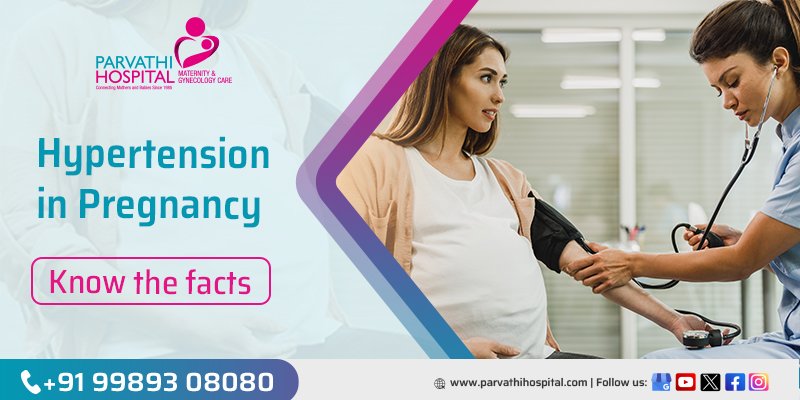Subtotal $0.00
Hypertension in Pregnancy: Know the facts
Blood pressure more than or equal to 140/90 that starts in the second half of pregnancy, usually after 20 weeks, is referred to as gestational hypertension. High blood pressure during pregnancy can affect your body differently than it typically would. If high blood pressure in pregnancy is not treated, difficulties could arise for both the mother and the fetus. Up to 10% of pregnancies are complicated by hypertension, the most frequent medical issue during pregnancy. To learn more about this, read until the end of the article. If you want to undergo hypertension treatment during pregnancy in Hyderabad, visit Parvathi Hospital, where the utmost care is taken of you and your baby to ensure safety and optimal care.
What is Hypertension During Pregnancy?
High blood pressure that develops after 20 weeks of pregnancy and disappears soon after your baby is born is known as pregnancy-related hypertension. In between 6% and 8% of pregnancies, it occurs. Your healthcare professional may also use gestational or pregnancy-induced hypertension to describe high blood pressure during pregnancy.
Unlike other forms of hypertension, gestational hypertension begins in the second part of pregnancy and disappears after delivery.
You must attend all of your prenatal sessions so your pregnancy care provider can take your blood pressure because high blood pressure may not present any apparent signs. Complications from high blood pressure during pregnancy are possible. For the remainder of your pregnancy, your doctor will closely monitor you and the fetus and help you control your blood pressure.
How is high blood pressure during pregnancy different from regular ones?
When you are pregnant, high blood pressure affects your body differently than when you are not. Your heart must work harder because it must pump far more blood during pregnancy. Your body is put under more strain as a result. Additionally, high blood pressure might impact the placenta’s growth and operation. This implies the fetus might not receive the nutrients it requires to grow normally. If you have high blood pressure, you run a greater chance of experiencing difficulties before birth, during labor, and after delivery with your kid.
Side effects of hypertension during pregnancy
Gestational or pregnancy-induced hypertension can cause several adverse side effects and difficulties for the mother and the unborn child. To lower these risks, monitoring and treating hypertension during pregnancy is crucial. The following are a few possible negative consequences and complications:
1. Preeclampsia
Hypertension during pregnancy increases the risk of developing preeclampsia, a severe condition characterized by high blood pressure, protein in the urine, and organ dysfunction. Preeclampsia can lead to complications such as seizures (eclampsia), impaired organ function, and poor fetal growth.
2. Placental Abruption
High blood pressure can increase the risk of placental abruption, where the placenta separates from the uterine wall prematurely. This can cause heavy bleeding and jeopardize both the mother’s and baby’s health.
3. Preterm Birth
Hypertension can lead to preterm birth, which increases the risk of complications for the baby, including respiratory distress syndrome and developmental issues.
4. Low Birth Weight
Babies born to mothers with hypertension during pregnancy are at higher risk of being born with a low birth weight, which can lead to health problems for the baby.
5. Intrauterine Growth Restriction (IUGR)
Hypertension can impair blood flow to the placenta, restricting the baby’s growth and development, a condition known as IUGR.
6. Kidney and Liver Problems
Hypertension can strain the mother’s kidneys and liver, potentially causing long-term damage.
7. Cardiovascular Complications
High blood pressure during pregnancy may increase the risk of cardiovascular issues for the mother later in life.
8. Stroke
In severe cases, hypertension during pregnancy can lead to a stroke, which can be life-threatening for both the mother and the baby.
Complications for the Baby
Babies born to mothers with hypertension may experience low oxygen levels, difficulty feeding, and an increased risk of long-term health problems.
Postpartum Hypertension
Some women may experience high blood pressure after giving birth, which requires ongoing monitoring and management.
Final Words
It’s crucial to visit your doctor in the first trimester so they can check your average blood pressure range. Identifying persistent hypertension during the second trimester can be challenging because blood pressure typically drops. If your blood pressure is higher than 140/90 mmHg during pregnancy, your doctor might recommend medication to lower it. Diastolic blood pressure above 110 mmHg or systolic blood pressure over 160 mmHg during pregnancy may necessitate hospitalization for therapy.
Pregnancy-related high blood pressure (hypertension) usually disappears once the baby is delivered. However, it raises your chance of developing high blood pressure and heart disease later. You might need medication for a few weeks following delivery if you have a severe case of prenatal hypertension or preeclampsia. If you have a robust chance of high blood pressure at delivery, it’s crucial to contact your doctor within 10 days postpartum (after your baby is delivered).


Comments are closed